| Listing 1 - 10 of 17 | << page >> |
Sort by
|
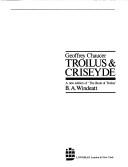
ISBN: 0582490723 0582031974 Year: 1982 Publisher: White Plains (NY) : Longman,
Abstract | Keywords | Export | Availability | Bookmark
 Loading...
Loading...Choose an application
- Reference Manager
- EndNote
- RefWorks (Direct export to RefWorks)
-Troilus (Legendary character) --- Cressida (Fictitious character) --- -Trojan War --- -Poetry --- Poetry --- Troy (Extinct city) --- Troilus (Legendary character) --- Trojan War --- Poetry.
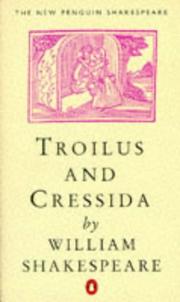
ISBN: 0140707417 Year: 1987 Publisher: Harmondsworth Penguin books
Abstract | Keywords | Export | Availability | Bookmark
 Loading...
Loading...Choose an application
- Reference Manager
- EndNote
- RefWorks (Direct export to RefWorks)
Cressida (Fictitious character) --- Troilus (Legendary character) --- Trojan War --- Drama --- Drama --- Drama --- Troy (Extinct city) --- Drama.
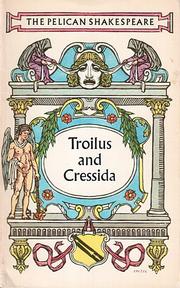
ISBN: 0140714138 Year: 1983 Publisher: Harmondsworth Penguin books
Abstract | Keywords | Export | Availability | Bookmark
 Loading...
Loading...Choose an application
- Reference Manager
- EndNote
- RefWorks (Direct export to RefWorks)
Cressida (Fictitious character) --- Troilus (Legendary character) --- Trojan War --- Drama --- Drama --- Drama --- Troy (Extinct city) --- Drama.
Book
ISBN: 3631313128 Year: 1997 Publisher: Frankfurt am Main Lang
Abstract | Keywords | Export | Availability | Bookmark
 Loading...
Loading...Choose an application
- Reference Manager
- EndNote
- RefWorks (Direct export to RefWorks)
Cressida (Fictitious character) --- Troilus (Legendary character) --- Trojan War --- Poetry --- Poetry --- Poetry --- Troy (Extinct city) --- Poetry.
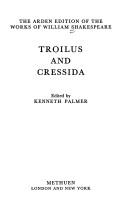
ISBN: 0416177905 0416476805 9780416476804 9780416177909 Year: 1982 Publisher: London Methuen
Abstract | Keywords | Export | Availability | Bookmark
 Loading...
Loading...Choose an application
- Reference Manager
- EndNote
- RefWorks (Direct export to RefWorks)
English literature --- Troilus (Legendary character) --- Troïlos (Personnage légendaire) --- Guerre de Troie --- Cressida (Fictitious character) --- Troy (Extinct city) --- -Troilus (Legendary character) --- -Trojan War --- -Mythology, Greek --- -Ilion (Extinct city) --- Ilium (Extinct city) --- Troia (Extinct city) --- Troja (Extinct city) --- Trovaharabesi (Extinct city) --- Troy (Ancient city) --- Troïlos (Personnage légendaire) --- Trojan War --- Drama --- Théâtre --- -Drama --- Ilion (Extinct city) --- Turkey --- Drama. --- Antiquities --- Troilus (Legendary character) - Drama --- Cressida (Fictitious character) - Drama --- Trojan War - Drama --- Troy (Extinct city) - Drama
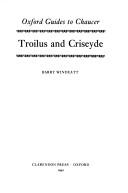
ISBN: 0198111959 Year: 1992 Publisher: Oxford Clarendon
Abstract | Keywords | Export | Availability | Bookmark
 Loading...
Loading...Choose an application
- Reference Manager
- EndNote
- RefWorks (Direct export to RefWorks)
Cressida (Fictitious character) --- Love in literature --- Troilus (Legendary character) in literature --- Trojan War --- Literature and the war --- Chaucer, Geoffrey, --- Chaucer, Geoffrey, --- Sources.
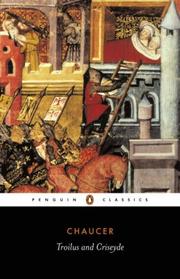
ISBN: 0140442391 9780140442397 Year: 1980 Publisher: Harmondsworth: Penguin books,
Abstract | Keywords | Export | Availability | Bookmark
 Loading...
Loading...Choose an application
- Reference Manager
- EndNote
- RefWorks (Direct export to RefWorks)
Troilus (Legendary character) --- -Trojan War --- -Cressida (Fictitious character) --- -Narrative poetry, English (Middle) --- English narrative poetry, Middle --- Middle English narrative poetry --- Narrative poetry, English --- Narrative poetry, Middle English --- English poetry --- Mythology, Greek --- Poetry --- Troy (Extinct city) --- -Poetry --- Narrative poetry, English (Middle) --- Cressida (Fictitious character) --- Trojan War --- Poetry. --- Troilus (Legendary character) - Poetry --- Trojan War - Poetry --- Troy (Extinct city) - Poetry
Book
ISBN: 0713158549 0713158530 9780713158540 Year: 1976 Volume: 59 Publisher: London : Edward Arnold,
Abstract | Keywords | Export | Availability | Bookmark
 Loading...
Loading...Choose an application
- Reference Manager
- EndNote
- RefWorks (Direct export to RefWorks)
Cressida (Fictitious character) --- Princes in literature. --- Troilus (Legendary character) in literature. --- Trojan War --- Women in literature. --- Literature and the war. --- Chaucer, Geoffrey, --- Troy (Extinct city) --- In literature. --- Cressida (Fictitious character). --- Princes in literature --- Troilus (Legendary character) in literature --- Women in literature --- Woman (Christian theology) in literature --- Women in drama --- Women in poetry --- Criseyde (Fictitious character) --- Literature and the war --- CHAUCER (GEOFFREY), d. 1400 --- TROILUS AND CRISEYDE
Book
ISBN: 019811687X 9780198116875 Year: 1970 Publisher: Oxford : Clarendon press,
Abstract | Keywords | Export | Availability | Bookmark
 Loading...
Loading...Choose an application
- Reference Manager
- EndNote
- RefWorks (Direct export to RefWorks)
Troilus (Legendary character) in literature --- Trojan War --- Cressida (Fictitious character) --- Ambiguity in literature --- Princes in literature --- Grief in literature --- Literature and the war --- Chaucer, Geoffrey, --- Troy (Extinct city) --- In literature --- -English poetry --- -Grief in literature --- Criseyde (Fictitious character) --- English literature --- Mythology, Greek --- Roman influences --- Chaucer, Geoffrey --- -In literature --- Ambiguity in literature. --- English poetry --- Grief in literature. --- Princes in literature. --- Troilus (Legendary character) in literature. --- Roman influences. --- Literature and the war. --- In literature. --- Cressida (Fictitious character). --- Trojan War - Literature and the war --- Chaucer, Geoffrey, - -1400 - Troilus and Criseyde --- Troy (Extinct city) - In literature
Book
ISBN: 1282621033 9786612621031 1846156610 1843841606 Year: 2008 Publisher: Cambridge ; Rochester, NY : D.S. Brewer,
Abstract | Keywords | Export | Availability | Bookmark
 Loading...
Loading...Choose an application
- Reference Manager
- EndNote
- RefWorks (Direct export to RefWorks)
Issues relating to the male characters and the construction of masculinities in Chaucer's masterpiece of love found and love lost are explored here. Collectively the essays address the question of what it means to be a man in the Middle Ages, what constitutes masculinity in this era, and how such masculinities are culturally constructed; they seek to advance scholarly understanding of the themes, characters, and actions of Troilus and Criseyde through the hermeneutics of medieval and modern concepts of manliness. Throughout, they argue that Troilus and the other characters, including Criseyde, are subject to multiple and conflicting interpretations, especially in regard to the intersections of their genders with their sexual performances and their conflicted relationships to generic expectations for gendered conduct. Contributors: JOHN M. BOWERS, MICHAEL CALABRESE, HOLLY A. CROCKER, KATE KOPPELMAN, MOLLY MARTIN, MARCIA SMITH MARZEC, GRETCHEN MIESZKOWSKI, JAMES J. PAXSON, TISON PUGH, R. ALLEN SHOAF, ROBERT S. STURGES, ANGELA JANE WEISL, RICHARD ZEIKOWITZ.
Men in literature. --- Masculinity in literature. --- Masculinity --- Troilus (Legendary character) in literature. --- Cressida (Fictitious character) --- Criseyde (Fictitious character) --- Masculinity (Psychology) in literature --- History. --- Chaucer, Geoffrey, --- Chaucer, Jeffrey, --- Chʻiao-sou, Chieh-fu-lei, --- Chieh-fu-lei Chʻiao-sou, --- Choser, Dzheffri, --- Choser, Zheoffreĭ, --- Cosvr, Jvoffrvi, --- Tishūsar, Zhiyūfrī, --- Characters --- Men. --- Chaucer. --- Gender. --- Gendered conduct. --- Love. --- Medieval masculinity. --- Middle Ages. --- Relationships. --- Troilus and Criseyde.
| Listing 1 - 10 of 17 | << page >> |
Sort by
|

 Search
Search Feedback
Feedback About UniCat
About UniCat  Help
Help News
News